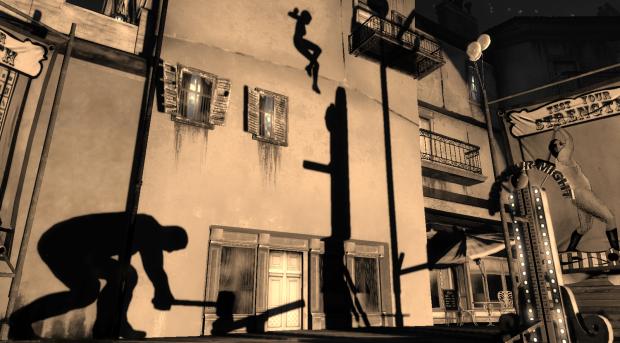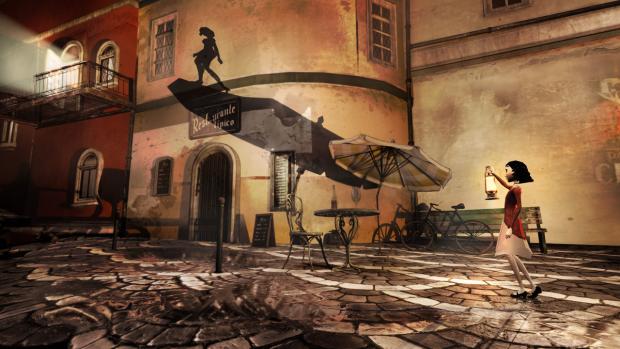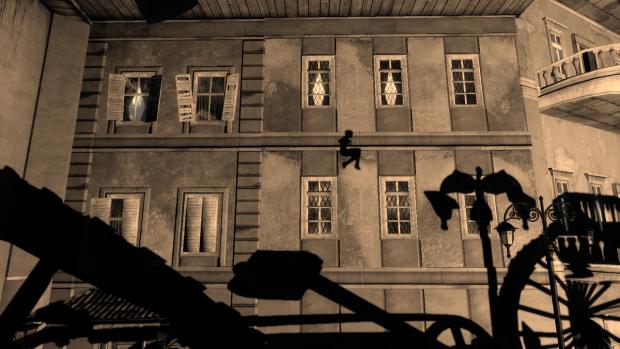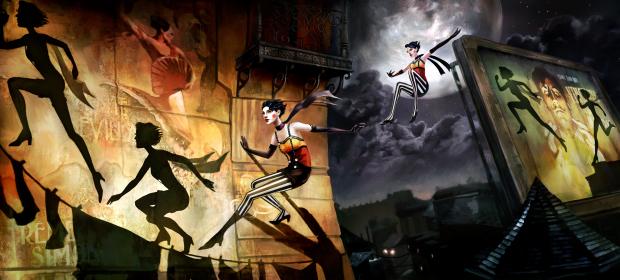Children are a vastly under-used demographic in video games. Sure, there are games aimed at youngsters, but very few adult-orientated games feature children in any meaningful way. And in fairness, there’s good reason. So many pitchforks aimed at so many people these days, means that you certainly can’t have a child killed in a game (and to be honest, why would you want to?) and there are other unmentionable subjects that don’t even bare thinking about.
No. Children are off the agenda.
Apparently Compulsion Games didn’t get that memo, and have crafted a third-person puzzler with eye-catching visuals that tell a young girl’s story, and to be honest, in places it gets a bit dark.
Didi is the child in question, though you never actually control her. Instead, you control Dawn, her shadow friend. It never becomes clear what Dawn actually is until very late on, and even then it’s only strongly alluded to. In fact, a lot of the mechanics in the game are never really explained at all, and you are asked to take a flight of fancy and just believe. Take the strange glowing lights that litter the three main game areas, for example – they power things in this world, but it’s never explained what they are. Collectibles are standard fare, at least: letters, pictures, the usual thing.

But the best part of Contrast is the idea itself. While the game is itself in three-dimensions, a hefty portion of your time will be spent in 2D and solving environmental puzzles (often involving boxes) in order to progress. In the right lighting, Dawn can flatten into a 2D shadow realm of sorts, and this is the meat of the game.
Unfortunately, despite always looking lovely, the controls themselves leave a bit to be desired. Jumping is awkward at times, meaning some of the more tricky platforming sections become an exercise in frustration. The puzzles themselves are never very hard and are mostly solvable by scanning the environment, or moving a spotlight in the right place. Instead they feel more in service of slowing the pace of the story down, because Contrast is a short game, with three main levels leading to the final scenes all told within 3-4 hours, depending on how quickly you solve the puzzles.
The story is one worth telling, even if it’s not exactly breaking new ground. Didi’s mother is a singer, playing clubs at night and leaving her to put herself to bed. Discovered early on through eavesdropping, there is a secret revealed to Didi from her mother Kat, speaking to her father Johnny, who himself is desperate to reconcile their relationship and get back to family life.

Mobsters are involved in schemes, and there are some scenes that try to pull on the heart strings, but it’s all told via shadows, because playable character Dawn cannot be seen by others, and the inference is that she can only see people’s shadows herself.
It’s a heart-warming tale, though, and one most people can relate to. As other characters become involved there’s a genuine feeling that you don’t know how things will wrap up, which is a refreshing change from the norm, as most games tend to telegraph their twists. That it ends fairly predictably is neither here nor there, as the journey is the reward. Some non-essential areas even flesh out the world further, as a huge pair of shadows are cast on a wall, allowing Dawn to scale them and grab a collectible.
Unfortunately, Contrast can be very frustrating – as getting through each section of gameplay is marred by some strange problems. As you’d expect, there are a multitude of short cut-scenes, both story-based and also there to show you what to do next. These are always jarring because the transition just isn’t smooth, and the umpteenth fade to black before the cut-scene kicks in is maddening, especially when most gamers will already have worked out what needs to be done before it even happens.

On top of that, there are numerous occasions where you can get stuck to the scenery, or will fall to your death because the controls are too fiddly. Some puzzles require you to jump, then hit the right trigger (to transition to the shadow world), then hit B to “dash” through a barrier. This seems fine, but it just feels awkward. At one point I even got stuck underneath a crate I was carrying, forcing me to restart from the last save point. It’s not really riddled with bugs, but there are occurrences that stand out, and they happen often enough that they’re worth noting.
The voice acting is decent, though. Some excellent performances really hammer home the setting and mood, matched by the theme tune, which is beautifully sung, and genuinely feels like a reward when the credits roll. There’s not a huge amount to come back for, as there aren’t many collectibles overall. However, some of them are rewards for solving optional puzzles, which is a nice touch.
VERDICT: When it works, Contrast is a beautifully executed vaudevillian tale of sadness and intrigue, but when it doesn’t, the frustrating glitches and awkward controls will drive you mad. Contrast is interesting, and something different, unique and new, and for that, I think it’s worth investigating for yourself, especially if you can see past the bad and get to the good.

DECENT. A 6/10 indicates that, while this game could be much better, it still has a fair amount to offer the player. It might be an interesting title sabotaged by its own ambition, or a game denied greater praise by some questionable design choices. Don’t avoid it outright, but approach it with caution.
Review code supplied by publisher.





